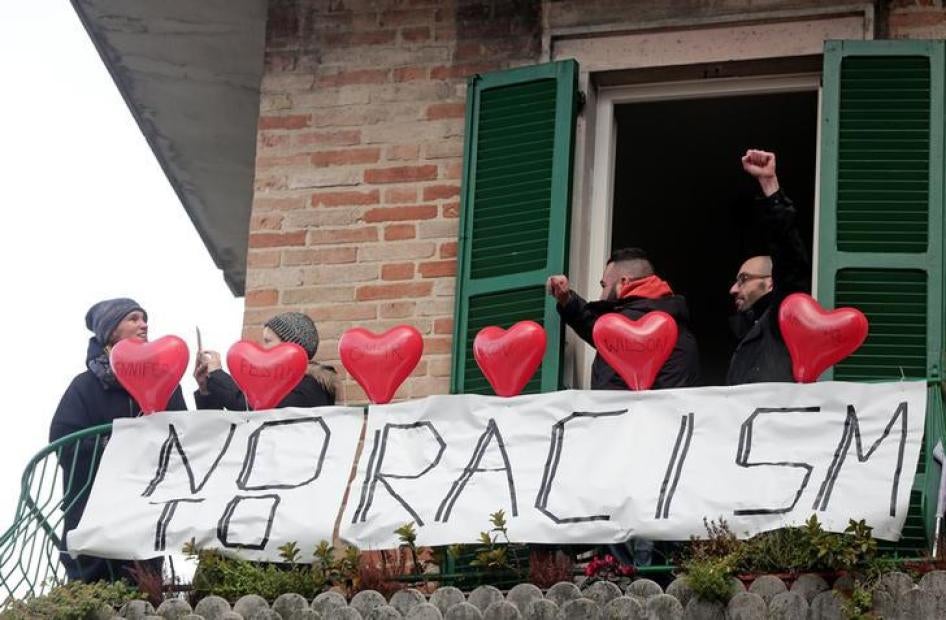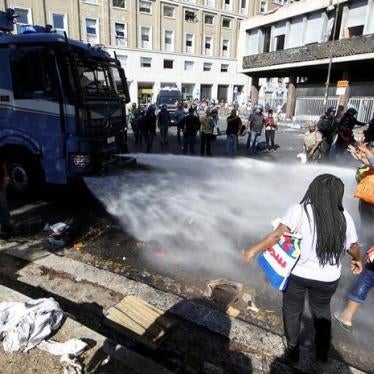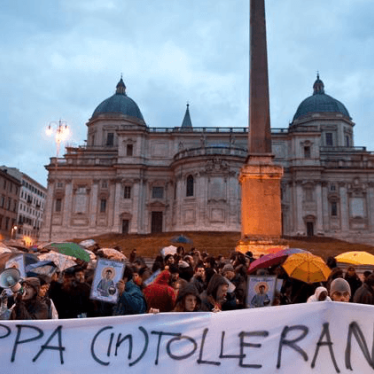Italian politics are never boring, and election campaigns are always times of particularly strident debate. But the tenor of the campaign leading up to Italy’s national elections on March 4 on immigration issues is profoundly alarming.
In the wake of a drive-by shooting targeting sub-Saharan Africans in Macerata, in central Italy, on February 3, many politicians seem more concerned with blaming irregular immigrants than with forcefully condemning an act of racist violence that left five men and one woman injured. The confessed shooter, Luca Traini, a former failed candidate for the anti-immigrant party Northern League, said he was distraught over the horrific death and dismemberment of an Italian woman and wanted to “shoot black men.” Three Nigerian men have been charged with the murder.
Matteo Salvini, the leader of the Northern League (NL), qualified his condemnation of the shooting saying, “it’s clear that out-of-control immigration, an invasion…leads to social conflict.” Silvio Berlusconi, former prime minister and leader of Forza Italia (FI), took the opportunity to repeat an old theme of his: undocumented migrants in Italy are all “ready to commit crimes,” creating a “social bomb about to explode.”
There are clear links between Traini and extreme-right groups—a copy of Mein Kampf along with other Nazi publications was found in his home and he has a neo-Nazi tattoo on his forehead. But the leader of the far-right Fratelli d’Italia (FdL), Georgia Meloni, insisted he was simply unbalanced, and that fighting “terrorism and the invasion of illegal immigrants” should be the priority rather than debating fascism and racism “that no longer exist.”
Far-right, ideologically racist violence has reared its ugly head in Italy before but everyday intolerance and concerns and grievances over the significant increase of boat migration permeate Italian society. Exploiting and pandering to these sentiments, in rhetoric and in policy, present a serious long-term threat to the fabric of Italian society.
Current polls suggest that no single party is likely to achieve a clear victory in the elections on March 4 and it is anyone’s guess what strange deals may be struck to form a government. But the direction and tone of the discussion around migration has already done significant damage, whoever wins, and Italy’s vibrant nongovernmental groups will have their work cut out for them to promote fair, rights-respecting policies.
A FI-NL-FdL coalition offers a rights-be-damned law-and-order approach with a heavy dose of nativism. Their explicit campaign pledges range from pushbacks of boat migrants to Libya to eliminating humanitarian visas that allow particularly vulnerable migrants to remain in Italy.
Meanwhile the populist Five Star Movement—never coherent on immigration issues— took a sharp turn to the right after a poor showing in 2017 local elections. Its leader, Luigi Di Maio, led the charge last year against nongovernmental organizations saving lives in the Mediterranean and has lately taken up the “Italians First” slogan.
The governing Democratic Party (PD) has a more nuanced approach but its focus on bringing boat arrivals down goes hand in hand with accepting that people will be trapped in incredibly abusive conditions in Libya. It has also offered only a muted response to Traini’s racist rampage.
Over 600,000 migrants and asylum seekers have disembarked in Italy since 2014. An unknowable but significant number moved onward to other EU countries, but increased identification measures and reinforced border controls by Italy’s northern neighbors over the past two years mean that many remain in Italy, either as undocumented migrants or as asylum seekers in the country’s burgeoning but still overwhelmed reception system. There are legitimate concerns around mismanagement, corruption, and inadequate integration measures that both impede newcomers from contributing to society and nurture social tensions.
By supporting Italy in trying to stop the boats while at the same time failing to share responsibility for those arriving, the rest of the EU has helped to create fertile ground for anti-immigrant politics. A plan to relocate tens of thousands of asylum seekers to other EU countries fell 70 percent short of its target of 39,600 people. Meanwhile, governments around the EU are insisting that Italy take back people who travelled onward on their own, holding Italy to the Dublin Regulation, which requires the first country of entry to take responsibility for assessing asylum applications. Probably the only issue all political parties agree on is the need to reform the Dublin Regulation.
Italy faces real challenges, but fear-mongering and throwing rights to the wind shouldn’t be part of the solution. Italy’s political leadership should show the courage to confront rising racism and offer a positive, humane agenda on migration. And the rest of the EU should help by demonstrating a genuine commitment to sharing responsibility.










